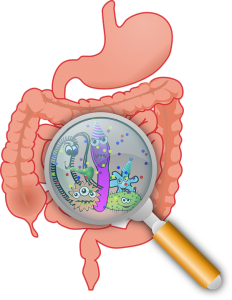
Bowl of mixed nuts on rustic wooden table in natural light.
Almonds, walnuts, peanuts, and pistachios are all delicious nutrient-dense snacks. Nuts are often mentioned as healthy snacks for heart health. Not to mention that they taste great and can be a healthy replacement to chips as a salty and crunchy snack. But did you know that they can also help your brain health? A recent study shows that eating a little bit of nuts everyday can benefit brain health.
About nuts
Nuts come in many varieties, but they all provide rich health benefits. These tasty plant-based treats contain many important nutrients like:
- healthy fats like monounsaturated (MUFA) and polyunsaturated (PUFA) fats
- protein
- soluble and insoluble fibers
- vitamin E
- vitamin K
- folate
- thiamine
- minerals such as magnesium, copper, potassium, and selenium
- antioxidants
- phytosterols
Because of their antioxidant content, nuts are great for reducing the amount of inflammation in the body. This in turn can help lower risk of inflammatory related conditions like heart disease and type 2 diabetes.
In particular, eating just an ounce or two of almonds daily can reduce blood glucose levels after meal time. They can also increase satiety or fullness in those with type 2 diabetes. Also, eating an ounce or so of walnuts daily can help some people lose weight since they also help increase fullness and reduce insulin levels. Finally, research shows that eating an ounce and a half of pistachios daily can help improve lipid markers such as reducing LDL-C or “bad” cholesterol.
Nuts and brain health
A 2019 study looked at data from the China Health and Nutrition Survey over 22 years. Nut intake data was collected from over 4800 study participants in 1991, 1993, and during the years of cognitive function data collection in 1997, 2001, 2004, and 2006. Study results show that nut intake is associated with reduced levels of cognitive decline.
In particular, eating more than 10 grams or more of nuts daily, which equates to about 2 teaspoons a day, may benefit brain health. In fact, the researchers report that this small amount of nuts can improve thinking, reasoning, and memory. Also, they report that this same amount of nuts can improve the brain function of older adults by about 60-percent compared to those who didn’t eat nuts.
Interestingly enough, the same antioxidant and anti-inflammatory qualities that help improve heart health also benefits brain health. Therefore, make sure to add nuts to your daily routine to reap these awesome health benefits.
Other ways to help brain health
Now if you’re allergic to nuts, this talk of nuts and health benefits may be a bummer. However, that doesn’t mean that they aren’t other ways you can improve brain health. Read below for tips on keeping your brain at its healthiest.
- Keep your brain busy: As the saying goes “Use it or lose it.” The same concept works for brain health. Just like you exercise your body to stay fit, you should not forget to do the same for your brain. Crossword puzzles, reading, drawing, painting, and even crafts can help keep your brain strong.
- Exercise your body: Like I mentioned before, exercise for your body is important for heart health, but also for brain health too. This is because your heart pumps all-important oxygen-rich blood to the brain to keep it healthy. Every step counts, so walk, jog, bike, dance, or do whatever movement you enjoy. Your brain will thank you.
- Improve your diet: Eating lots of fiber-rich and antioxidant-rich fruits and vegetables can benefit brain health as well as overall health. This is because, just like nuts, these antioxidants reduce inflammation in the body that can increase chronic disease risk. Color your plate with a variety of fruits and vegetables each day to reap the benefits of the different antioxidants they contain that possess different healthful properties.
- Limit alcohol intake and stop smoking: Smoking can constrict blood vessels , which means less oxygen reaches your brain. For help to quit smoking, visit Smokefree.gov for helpful resources. And as far as alcohol goes, research shows that more than two standard drinks a day can increase dementia risk. A standard drink is equal to 12 ounces beer, 5 ounces wine, or 1.5 ounces liquor.
- Take a supplement for brain health: If you don’t feel like you’re getting enough brain food in your diet, then you can add a brain health supplement like UltaMind to your daily routine. UltaMind by Vita Sciences contains innovative compounds like St. John’s Wort and Gingko biloba, to name a few that have been shown to support brain health, memory, focus, and concentration.
References:
de Souza, R., Schincaglia, R. M., Pimentel, G. D., & Mota, J. F. (2017). Nuts and Human Health Outcomes: A Systematic Review. Nutrients, 9(12), 1311. doi:10.3390/nu9121311
Harvard Health Publishing Harvard Medical School (accessed April 4, 2019) “12 ways to keep your brain young.” https://www.health.harvard.edu/mind-and-mood/12-ways-to-keep-your-brain-young
Li, Ming and Shi, Z. (February 2019) “A Prospective Association of Nut Consumption with Cognitive Function in Chinese Adults Aged 55+ – China Health and Nutrition Survey.” The Journal of Nutrition, Health, and Aging, 23(2): 211-216.
Roche, Ph.d., B. (July 17, 2014) “10 Ways to Improve Your Brain Health.” Psychology Today, https://www.psychologytoday.com/us/blog/iq-boot-camp/201407/10-ways-improve-your-brain-health
 Anyone who has been on a healthy lifestyle plan knows that you should try not to drink your calories. This is because you want to cut calories wherever you can to lose weight. However, cutting out those sugary drinks are not only helpful in weight loss, but also in cutting your disease risk. In fact, a recent study found that those who drank less sugary drinks had a lower risk of chronic diseases and early death as compared to those who drank sugary drinks often.
Anyone who has been on a healthy lifestyle plan knows that you should try not to drink your calories. This is because you want to cut calories wherever you can to lose weight. However, cutting out those sugary drinks are not only helpful in weight loss, but also in cutting your disease risk. In fact, a recent study found that those who drank less sugary drinks had a lower risk of chronic diseases and early death as compared to those who drank sugary drinks often. If you’ve ever tried to eat healthy, which I’m sure most of us have, then you may have been told to eat more vegetables. This is a tried and true statement that is vital to every healthy lifestyle. This is because plant-based foods like fruits and vegetables are full of gut-healthy fiber and antioxidants. In turn, this helps to lower your risk of chronic diseases like heart disease and diabetes. That is why it may not be surprising that a recent study shows that a plant-based diet may help diabetes treatment.
If you’ve ever tried to eat healthy, which I’m sure most of us have, then you may have been told to eat more vegetables. This is a tried and true statement that is vital to every healthy lifestyle. This is because plant-based foods like fruits and vegetables are full of gut-healthy fiber and antioxidants. In turn, this helps to lower your risk of chronic diseases like heart disease and diabetes. That is why it may not be surprising that a recent study shows that a plant-based diet may help diabetes treatment. Although some fats are healthy in a balanced diet, too much of anything can be a harmful thing. For some people, like those with irritable bowel syndrome, too much fat in the diet may cause digestive distress. And for those with conditions like pancreatitis, fat is not digested well, so must be limited in the diet. Recent research shows that anyone, no matter their health status, may be at risk for gut health issues on a high fat diet.
Although some fats are healthy in a balanced diet, too much of anything can be a harmful thing. For some people, like those with irritable bowel syndrome, too much fat in the diet may cause digestive distress. And for those with conditions like pancreatitis, fat is not digested well, so must be limited in the diet. Recent research shows that anyone, no matter their health status, may be at risk for gut health issues on a high fat diet. When you think of high blood pressure, or hypertension, your heart health may be the first thing that comes to mind. But what many may not realize is that blood pressure also relates to the health of your mind. It makes sense if you think about it. All the body’s tissues and organs require oxygen from the blood that flows from the heart. If something is affecting blood flow, then this can affect the health of many parts of your body. Let’s look a bit more at blood pressure and how controlling it can improve the health of your heart and mind.
When you think of high blood pressure, or hypertension, your heart health may be the first thing that comes to mind. But what many may not realize is that blood pressure also relates to the health of your mind. It makes sense if you think about it. All the body’s tissues and organs require oxygen from the blood that flows from the heart. If something is affecting blood flow, then this can affect the health of many parts of your body. Let’s look a bit more at blood pressure and how controlling it can improve the health of your heart and mind. When most people start an exercise program, they may be trying to do one of a few things. Most people move more to lose weight, some exercise to gain muscle, and some just want to tone up. However, the benefit from exercise that most may not think of is improved mood. A recent study shows that moving more each day may have prevent depressive symptoms. Not to mention, that research also shows that preventing or improving such symptoms can help improve health outcomes in those with diabetes.
When most people start an exercise program, they may be trying to do one of a few things. Most people move more to lose weight, some exercise to gain muscle, and some just want to tone up. However, the benefit from exercise that most may not think of is improved mood. A recent study shows that moving more each day may have prevent depressive symptoms. Not to mention, that research also shows that preventing or improving such symptoms can help improve health outcomes in those with diabetes. Stroke continues to be one of the top ten leading causes of death in the United States. And even if a person survives a stroke, they may face permanent disability from a stroke. In turn, having a stroke could greatly impact a person’s quality of life. This is why it’s so important to keep learning more about how this disease can be prevented. A recent study shows that taking a fish oil supplement each day may help lower risk of stroke.
Stroke continues to be one of the top ten leading causes of death in the United States. And even if a person survives a stroke, they may face permanent disability from a stroke. In turn, having a stroke could greatly impact a person’s quality of life. This is why it’s so important to keep learning more about how this disease can be prevented. A recent study shows that taking a fish oil supplement each day may help lower risk of stroke. You can’t talk about a heart healthy lifestyle without at least referring to the Mediterranean diet. That’s because this Greek-style eating plan is full of heart healthy foods and other healthful tips. But did you know that this diet is also good for brain health? Recent research shows that certain nutrients found in the Mediterranean diet can help with brain health aging in older adults.
You can’t talk about a heart healthy lifestyle without at least referring to the Mediterranean diet. That’s because this Greek-style eating plan is full of heart healthy foods and other healthful tips. But did you know that this diet is also good for brain health? Recent research shows that certain nutrients found in the Mediterranean diet can help with brain health aging in older adults. Now if you’ve ever tried to lose weight, which many of us have, then I’m sure you’ve heard the term metabolism. Usually you are told you either have “good” or “bad” metabolism. The only thing you may be sure of is that if you have a “bad” one then it will be harder for you to lose weight. But have you ever wondered what exactly this term means? If so, read below for some background on metabolism and a surprising look into how many of us have metabolic issues and what to do about it.
Now if you’ve ever tried to lose weight, which many of us have, then I’m sure you’ve heard the term metabolism. Usually you are told you either have “good” or “bad” metabolism. The only thing you may be sure of is that if you have a “bad” one then it will be harder for you to lose weight. But have you ever wondered what exactly this term means? If so, read below for some background on metabolism and a surprising look into how many of us have metabolic issues and what to do about it.